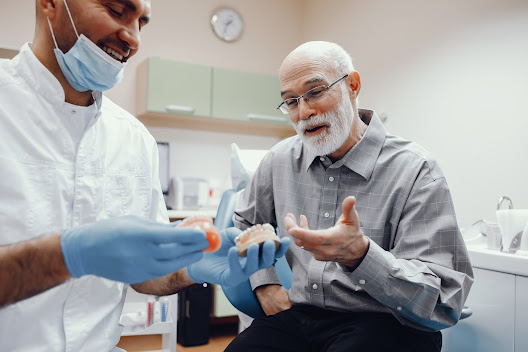What are Dentures?
Dentures are removable replacements for missing teeth, gums, and bones that have been caused due to tooth loss. They are made from remineralized collagen or cast materials to resemble the roots of your teeth. Complete dentures replace all the teeth, while a partial denture fills in the spaces created by missing teeth and prevents other teeth from changing position.
Who Needs Dentures?
Complete dentures usually are recommended when most or all of your natural teeth have been lost. Partial dentures are available as an alternative if you still have some natural teeth left. A complete or partial denture will provide support for facial muscles, improve chewing and make it easier to speak clearly. It will significantly enhance the appearance of your face, smile, and whole demeanor.
What Happens When You Get a Denture?
Dentures are a great option when all teeth have been lost, or all extraction sites have healed. The process takes about five appointments: an initial diagnosis is made, an impression is taken, and measurements are taken to make sure your bite and smile are natural, a “try-in” is placed to ensure proper color, shape, and fit; and finally your final denture is placed, following any minor adjustments.
You might feel discomfort after wearing your new dentures after the first few days to a week. It is normal and usually lasts for only a short period. Just remember to give your mouth time to adjust to its new, healthy state by eating soft types of food at first. The more you chew on your new dentures, the better they will feel. It would help if you also drank plenty of water or other liquids during this time to keep your mouth from getting dry.
How do you care for a denture?
It is essential to handle your denture with care, as it is fragile. Remove and clean your denture daily, preferably with a brush designed specifically for cleaning dentures, such as a toothbrush or a brush made for cleaning dentures. Gently brush the surface of the denture with either a denture cleanser or toothpaste. Never use harsh, abrasive cleaners on the denture because they can scratch it. If you wear a partial denture, remove it before brushing your natural teeth.
Should a denture be worn at night?
Many dentists recommend that you wear your denture almost constantly for the first two weeks. After that, you remove it at night best and soak the denture in a cleansing solution or water. Removing your denture during the night allows the gum tissue to rest, promoting the gums' better long-term health.
Do I need to continue seeing a Dentist regularly?
Regular dental checkups are essential for maintaining good oral health. Your teeth and gums will continue to change with age, and staying current with any changes is necessary. Dentists may need to adjust your dentures or possibly remake them if this is required to maintain a good fit. Do not try to adjust a denture yourself; do not use denture adhesives on a prolonged basis because this can contribute to bone loss.
Are there any alternatives to dentures?
When missing teeth are not restored, you lose important chewing support, and your broad smile loses that vitality needed to make a great first impression. Now there is another option besides dentures. Dental implants support permanently cemented bridges, eliminating the need for a denture. The cost tends to be greater, but the implants and bridges more closely resemble the “feel” of natural teeth, providing you with better quality of life.


Comments
Post a Comment